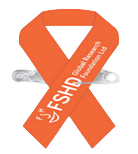New drug targets
FSHD is a progressive muscle wasting disease caused by a genetic mutation on chromosome 4 where a reduction in the number of repeated units in what is called the D4Z4 region, or mutations in a gene called SMCHD1, leads to the expression of a toxic gene called DUX4.
That is a simplified explanation of complex genetic condition (for a more in depth explanation see here . However, the sheer amount of variation seen in people with FSHD suggests that there are other elements involved in the development of FSHD. One of these other elements has been described in a recent paper published in the American Journal of Human Genetics.(1)
The new genetic variant was discovered in a family where seven members had the genetic mutation associated with FSHD but only four were clinically effected. This is not uncommon in FSHD. Geneticists call this penetrance, which is the extent to which a genetic mutation causes symptoms in people carrying it. So high penetrance means many of the people with the mutation will have symptoms.
Mutations in the genetic element in question, DNMT3B has been shown to increase the penetrance of FSHD. DNM3TB essentially acts as an additional switch to the D4Z4 region. When it is mutated this switch is removed leading to increased symptoms.
This is a significant finding. Understanding why some people develop symptoms and others do not in spite of identical genetic mutations could pave the way for treatments and a cure. In this case, DNM3TB could be a potential target for drug discovery.
The senior author of this study Professor Silvere van der Maarel will be visiting Australia for the 2016 annual FSHD Global Science week. If you would like more information on science week email science@fshdglobal.org or refer to our website
- van den Boogaard ML, Lemmers RJ, Balog J, Wohlgemuth M, Auranen M, Mitsuhashi S, et al. Mutations in DNMT3B Modify Epigenetic Repression of the D4Z4 Repeat and the Penetrance of Facioscapulohumeral Dystrophy. American journal of human genetics. 2016;98(5):1020-9.




